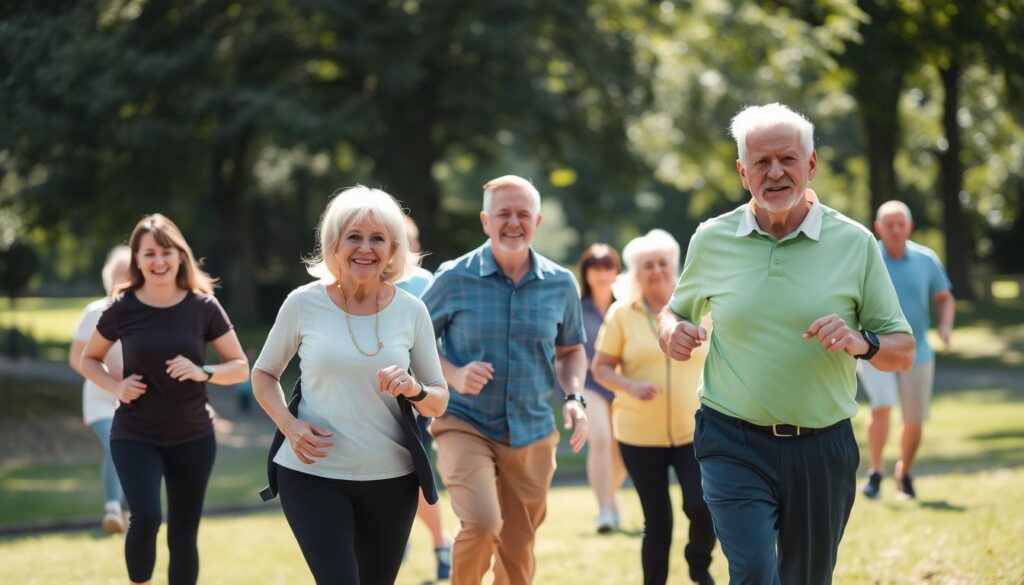A holistic approach to health integrates physical, mental, and nutritional wellness.
Physical Health: Building Your Foundation
Physical wellness forms the cornerstone of overall health. Regular movement, quality sleep, and proper recovery all contribute to a body that functions optimally and resists illness. Let’s explore tailored approaches for different lifestyles.

Exercise Routines for Different Lifestyles
For Office Workers
- Desk stretches every 30 minutes
- Lunchtime walks (aim for 3,000 steps)
- Standing meetings, when possible
- After-work strength training (20-30 minutes, 3x weekly)
- Weekend longer activities (hiking, cycling)
For Parents
- Family-friendly activities (bike rides, playground workouts)
- Short, high-intensity workouts during nap times
- Parent-child yoga sessions
- Stroller fitness groups
- Active household chores (gardening, vigorous cleaning)
For Seniors
- Low-impact water aerobics
- Tai Chi or gentle yoga for balance
- Daily walking (start with 10 minutes)
- Resistance band exercises for strength
- Chair exercises for mobility and flexibility

Sleep Hygiene Tips Backed by Recent Studies
According to a 2023 study in the Journal of Sleep Research, consistent sleep and wake times can improve sleep quality by up to 42%, even without increasing total sleep duration.
- Consistent Schedule: Go to bed and wake up at the same time daily, even on weekends.
- Light Management: Expose yourself to morning sunlight within 30 minutes of waking and limit blue light from screens 2 hours before bedtime.
- Temperature Control: Keep your bedroom between 65-68°F (18-20°C) for optimal sleep conditions.
- Caffeine Curfew: Avoid caffeine after 2 PM as it has a half-life of 5-6 hours in your system.
- Bedtime Routine: Develop a 30-minute wind-down ritual that signals to your body it’s time to sleep.
“Treat your body like a high-performance vehicle. Just as you wouldn’t put low-grade fuel in a Ferrari, don’t expect optimal performance without proper maintenance, quality fuel, and regular rest periods.”
Mental Wellness: Cultivating Inner Clarity
Mental health is equally important as physical health in our comprehensive health guide. The mind-body connection influences everything from immune function to energy levels. These evidence-based techniques can help you manage stress and maintain mental clarity.

Stress Management Techniques
4-7-8 Breathing Exercise
- Sit comfortably with your back straight
- Inhale quietly through your nose for 4 seconds
- Hold your breath for 7 seconds
- Exhale completely through your mouth for 8 seconds
- Repeat 3-4 times, twice daily
Pro Tip: This technique activates your parasympathetic nervous system, reducing anxiety within minutes.
Box Breathing Technique
- Inhale slowly for 4 counts
- Hold your breath for 4 counts
- Exhale slowly for 4 counts
- Hold the empty lungs for 4 counts
- Repeat for 5 minutes when stressed
Pro Tip: Used by Navy SEALs, this technique helps maintain calm under pressure.
Diaphragmatic Breathing
- Place one hand on your chest, another on your abdomen
- Breathe deeply through your nose, feeling your abdomen rise
- Keep your chest relatively still
- Exhale slowly through pursed lips
- Practice for 5-10 minutes daily
Pro Tip: This breathing pattern increases oxygen exchange by 30-40%.

Digital Detox Strategies
Research from the University of California found that the average person checks their phone 96 times per day—approximately once every 10 minutes.
- Tech-Free Zones: Designate specific areas in your home (like bedrooms and dining areas) as device-free spaces.
- Scheduled Disconnection: Set aside 2-3 hours daily where you completely disconnect from all digital devices.
- Notification Management: Turn off non-essential notifications and use “Do Not Disturb” features strategically.
- Digital Sabbath: Practice 24 hours each week without screens or digital engagement.
- Nature Immersion: Replace screen time with outdoor activities that reconnect you with the natural world.
“Success story: After implementing a digital sunset routine (no screens after 8 PM), Sarah experienced a 68% improvement in sleep quality and reported feeling more present with her family during evening hours.”
Nutritional Balance: Fueling Your System
Nutrition forms a critical component of any comprehensive health guide. What you eat directly impacts your energy levels, mood, cognitive function, and long-term health outcomes. Rather than following restrictive diets, focus on incorporating nutrient-dense foods and creating sustainable eating patterns.

Superfoods for 2024
| Superfood | Key Benefits | Scientific Evidence | Recommended Intake |
| Microalgae (Chlorella/Spirulina) | Complete protein, detoxification, and immune support | Research in Cardiovascular Therapeutics (2023) shows a 15% reduction in inflammatory markers | 1-3g daily, gradually increasing |
| Fermented Foods (Kimchi, Kefir) | Gut microbiome support, improved digestion | Cell (2021) study demonstrated improved microbiome diversity after 10 weeks | 1/4 cup daily of fermented vegetables |
| Sea Moss | Thyroid support contains 92 minerals | Marine Drugs (2022) review confirmed high iodine and antioxidant content | 1-2 tbsp of gel daily |
| Mushroom Complex (Lion’s Mane, Reishi) | Cognitive enhancement, stress adaptation | Journal of Alzheimer’s Disease (2023) showed improved cognitive markers | 500-1000mg extract daily |
| Cacao Nibs | Heart health, mood enhancement, and antioxidants | American Journal of Clinical Nutrition (2022) linked flavanols to improved blood flow | 1-2 tbsp daily |
| Hemp Seeds | Complete protein, omega fatty acids, fiber | Journal of Agricultural and Food Chemistry shows optimal omega-3:6 ratio | 2-3 tbsp daily |
| Moringa | Anti-inflammatory, vitamin/mineral rich | Frontiers in Pharmacology (2023) confirmed potent antioxidant properties | 1-2 tsp powder daily |

Meal Prepping Templates
Beginner Template
- Sunday Prep: 2 proteins, 3 vegetables, 1 grain
- Container System: 3-compartment containers
- Time Investment: 2 hours weekly
- Storage Strategy: 3-day rotation
- Starter Recipe: Sheet pan chicken with roasted vegetables and quinoa
Intermediate Template
- Bi-Weekly Prep: 3 proteins, 4 vegetables, 2 grains
- Component System: Store elements separately
- Time Investment: 3 hours bi-weekly
- Storage Strategy: Freezer-friendly portions
- Recommended Recipe: Batch-cooked stews, marinated proteins
Advanced Template
- Monthly System: Freezer meal rotation
- Batch Cooking: 4-6 complete meals
- Time Investment: 4-5 hours monthly
- Storage Strategy: Vacuum sealing
- Pro Recipe: Sous vide proteins with flash-frozen vegetables
Lifestyle Optimization: Creating Sustainable Habits
A comprehensive health guide must address how to integrate healthy practices into your daily life. The most effective health strategies are those you can maintain consistently over time. These practical approaches help you optimize your lifestyle for long-term wellness.

Time-Management Hacks for Health Routines
- Time-Blocking: Dedicate specific 30-minute blocks in your calendar for health activities, treating them as non-negotiable appointments.
- Health Habit Stacking: Attach new health habits to existing routines (e.g., stretching while your morning coffee brews).
- Two-Minute Rule: If a healthy activity takes less than two minutes (like preparing a vitamin pack), do it immediately without procrastination.
- Batch Health Tasks: Group similar health activities (meal prep, supplement organization) to maximize efficiency.
- Strategic Outsourcing: Identify which health tasks can be delegated or automated (grocery delivery, meal services) to free up time for exercise and self-care.

Social Connection-Building Activities
“Success story: Michael joined a weekend hiking group after reading about the importance of social connections in a comprehensive health guide. Within three months, he not only improved his fitness but also developed meaningful friendships that supported his overall wellness journey.”
Physical Activities
- Community sports leagues
- Group fitness classes
- Walking or running clubs
- Dance lessons
- Outdoor adventure groups
Mind-Enriching Connections
- Book clubs focused on wellness
- Meditation or mindfulness groups
- Cooking classes
- Community gardening
- Volunteer opportunities
Digital Connections
- Virtual fitness challenges
- Health-focused social media groups
- Online accountability partnerships
- Virtual cooking sessions
- Digital wellness retreats
Preventive Care: Investing in Your Future Health
A comprehensive health guide must emphasize the importance of preventive care. Regular screenings and proactive health measures can detect potential issues before they become serious problems. Understanding which screenings are appropriate for your age and risk factors is essential for long-term wellness.

Recommended Health Screenings by Age Group
| Age Group | Essential Screenings | Frequency | Additional Considerations |
| 20-30 Years | Blood pressure, cholesterol, skin checks, and dental exams | Every 1-2 years | STI testing based on risk factors |
| 30-40 Years | Above, plus thyroid function, blood glucose | Every 1-3 years | Baseline EKG, eye exams |
| 40-50 Years | Above plus mammograms (women), prostate exams (men), colonoscopy | Varies by test (1-5 years) | Bone density baseline for women |
| 50+ Years | All above plus hearing tests, lung cancer screening (smokers) | Annually, for most tests | Cognitive assessments, fall risk evaluation |

Vaccination Updates Post-COVID
The CDC now recommends that adults stay current with COVID-19 vaccines alongside traditional vaccinations as part of a comprehensive preventive care strategy.
- COVID-19 Vaccines: Annual updated boosters recommended for most adults, similar to flu vaccines.
- Influenza (Flu): Annual vaccination, with high-dose formulations available for adults 65+.
- Tdap/Td: Tetanus, diphtheria, pertussis booster every 10 years.
- Shingles (Shingrix): Two-dose series recommended for adults 50+.
- Pneumococcal: New recommendations include PCV15 or PCV20 for adults 65+ and those with certain medical conditions.
- HPV: Catch-up vaccinations are now recommended for adults through age 45 who haven’t been previously vaccinated.
Always consult with your healthcare provider about which vaccinations are appropriate for your specific health status, age, and risk factors.
Frequently Asked Questions About Health Advice
Why do health recommendations seem to change so frequently?
Is it better to focus on diet or exercise for overall health?
How can I determine which supplements I need?
How much sleep do I need for optimal health?
Can mental health practices impact physical health outcomes?
Conclusion: Your Path to Comprehensive Health
Creating optimal health is a journey rather than a destination. This comprehensive health guide provides evidence-based strategies across physical, mental, and nutritional dimensions, but the most important factor is consistency. Start with small, sustainable changes rather than attempting a complete lifestyle overhaul all at once.
Actionable Steps to Implement Today
- Begin a health journal to track your current habits and identify one area for improvement.
- Schedule a preventive care appointment appropriate for your age and risk factors.
- Incorporate one stress-reduction technique into your daily routine, even if just for 5 minutes.
- Add one additional serving of vegetables to your meals each day.
- Create a consistent sleep and wake schedule for the next week.
“Health is not about perfection but progression. Each small step compounds over time, creating resilience and vitality that supports everything else in your life.”

The ultimate goal of a comprehensive health approach: vibrant, balanced living
Take the First Step Toward Optimal Health
Download our free Personalized Health Assessment Tool to evaluate your current wellness status and identify key areas for improvement.
Ready to Transform Your Physical Health?
Download our Weekly Exercise Planner with customizable templates for different lifestyles and fitness levels.
Elevate Your Nutrition Knowledge
Get our 7-Day Superfood Meal Plan with shopping lists, recipes, and preparation guides.
Stay Informed About Your Health
Subscribe to our monthly Wellness Update for the latest health research, seasonal tips, and preventive care reminders.
Ready for Personalized Health Guidance?
Schedule a consultation with our health experts to create a customized wellness plan tailored to your unique needs and goals.



